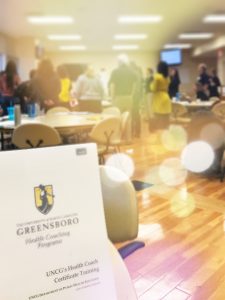
Participating in the UNCG Health Coaching training was a great experience! When I was invited to join the team, I was truly humbled. Although the commitment seemed initially daunting, I was thankful for my colleagues’ vote in confidence and extending this wonderful opportunity to join such a talented team of individuals. Having the opportunity to observe two full trainings certainly helped increase my confidence in fulfilling this role as a co-facilitator. Not to mention, planning meetings, e-mails and the meticulous organization of the curriculum content which made navigating and preparing for training more feasible.
What is amazing to witness is that the health coaching team operates in a health coaching spirit. Zeal, optimism and enthusiasm are a few words to describe the health coaching teams’ approach to training. During the training, the team provided support and encouragement each day which played a major role in my competence as a co-facilitator. I felt genuinely welcomed and supported from day one. The team provided opportunities for preparation and discussion between sessions, which made leading as a co-facilitator even more achievable.
After co-facilitating a few sections, I discovered facilitating became more natural than I expected. However, I did discover some concepts were more difficult to conceptualize for some; as many participants have been trained and socialized to think and approach their clients’ needs in a certain way. In these instances, the tag team approach from the health coaching team guaranteed that all content was not only covered but conveyed clearly – which was certainly reassuring!
Although I attribute most of my competence to team preparation and support, gaining practical experience coaching weekly at Wake Forest University helped tremendously. Having the opportunity to share practical experiences, utilize real-life client examples and sharing lessons learned with the participants allowed the training content easier to absorb for participants. Facilitating discussion with an engaged audience who desired to learn how to successfully master the art of health coaching certainly made co-facilitating more rewarding, too.
Overall, I learned that during trainings it is important to be confident in my practical knowledge, recognize that co-facilitating is a team effort, and modeling the health coaching spirit. I’ve also learned it is essential to employ health coaching traits while engaging with participants. This is important since there may be a few who ask various types of questions, provide challenging responses, and may even illustrate lack of interest in the training. However, the more enthusiastic and patient I am as a co-facilitator, the more responsive, dedicated and engaged the participants will be during the trainings.
As I prepare for upcoming trainings this summer, I look forward to my continued growth as a certified health coach, learning innovative ways to present training information and continuing to propel the excitement of our participants as they begin their journey of becoming a certified health coach!
Your Ally,
Crystal Dixon, MPH, MCHES, CHC